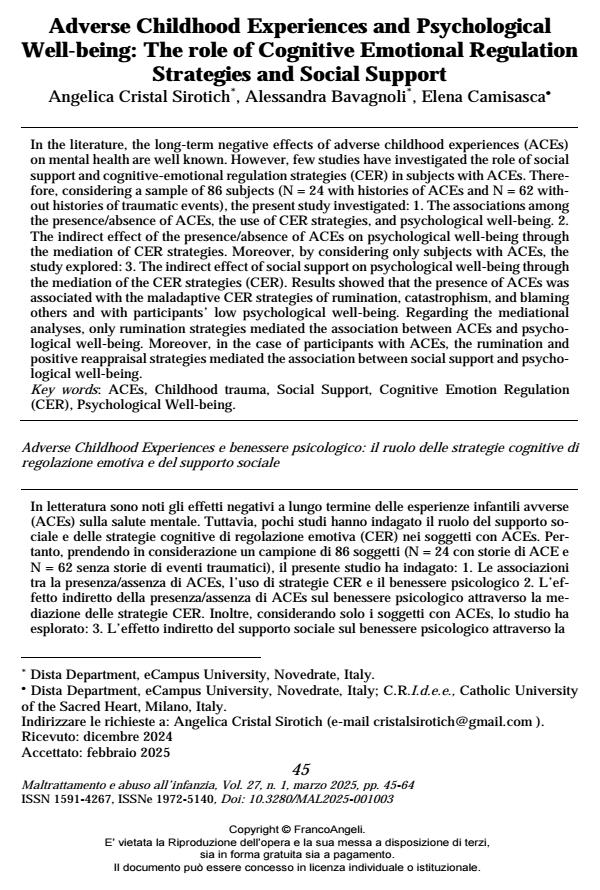Adverse Childhood Experiences and Psychological Well-being: The role of Cognitive Emotional Regulation Strategies and Social Support
Titolo Rivista MALTRATTAMENTO E ABUSO ALL’INFANZIA
Autori/Curatori Angelica Cristal Sirotich, Alessandra Bavagnoli, Elena Camisasca
Anno di pubblicazione 2025 Fascicolo 2025/1
Lingua Inglese Numero pagine 20 P. 45-64 Dimensione file 164 KB
DOI 10.3280/MAL2025-001003
Il DOI è il codice a barre della proprietà intellettuale: per saperne di più
clicca qui
Qui sotto puoi vedere in anteprima la prima pagina di questo articolo.
Se questo articolo ti interessa, lo puoi acquistare (e scaricare in formato pdf) seguendo le facili indicazioni per acquistare il download credit. Acquista Download Credits per scaricare questo Articolo in formato PDF

FrancoAngeli è membro della Publishers International Linking Association, Inc (PILA), associazione indipendente e non profit per facilitare (attraverso i servizi tecnologici implementati da CrossRef.org) l’accesso degli studiosi ai contenuti digitali nelle pubblicazioni professionali e scientifiche.
In the literature, the long-term negative effects of adverse childhood experiences (ACEs) on mental health are well known. However, few studies have investigated the role of social support and cognitive-emotional regulation strategies (CER) in subjects with ACEs. Therefore, considering a sample of 86 subjects (N = 24 with histories of ACEs and N = 62 without histories of traumatic events), the present study investigated: 1. The associations among the presence/absence of ACEs, the use of CER strategies, and psychological well-being. 2. The indirect effect of the presence/absence of ACEs on psychological well-being through the mediation of CER strategies. Moreover, by considering only subjects with ACEs, the study explored: 3. The indirect effect of social support on psychological well-being through the mediation of the CER strategies (CER). Results showed that the presence of ACEs was associated with the maladaptive CER strategies of rumination, catastrophism, and blaming others and with participants’ low psychological well-being. Regarding the mediational analyses, only rumination strategies mediated the association between ACEs and psychological well-being. Moreover, in the case of participants with ACEs, the rumination and positive reappraisal strategies mediated the association between social support and psychological well-being.
In letteratura sono noti gli effetti negativi a lungo termine delle esperienze infantili avverse (ACEs) sulla salute mentale. Tuttavia, pochi studi hanno indagato il ruolo del supporto sociale e delle strategie cognitive di regolazione emotiva (CER) nei soggetti con ACEs. Pertanto, prendendo in considerazione un campione di 86 soggetti (N = 24 con storie di ACE e N = 62 senza storie di eventi traumatici), il presente studio ha indagato: 1. Le associazioni tra la presenza/assenza di ACEs, l’uso di strategie CER e il benessere psicologico 2. L’effetto indiretto della presenza/assenza di ACEs sul benessere psicologico attraverso la mediazione delle strategie CER. Inoltre, considerando solo i soggetti con ACEs, lo studio ha esplorato: 3. L’effetto indiretto del supporto sociale sul benessere psicologico attraverso la mediazione delle strategie CER. I risultati hanno mostrato che la presenza di ACEs risulta associata alle strategie CER di ruminazione, catastrofismo e attribuzione delle responsabilità ad altri e a livelli inferiori di benessere psicologico. Le analisi di mediazione evidenziano come la strategia di ruminazione medi l’associazione tra presenza di ACEs e benessere psicologico. Inoltre, nel sottogruppo composto da partecipanti con ACEs, le strategie di ruminazione e di ristrutturazione cognitiva positiva mediano l’associazione tra supporto sociale e benessere psicologico.
Parole chiave:ACEs, Trauma infantile, support sociale, strategie cognitive di regolazione emotiva (CER), benessere psicologico.
Angelica Cristal Sirotich, Alessandra Bavagnoli, Elena Camisasca, Adverse Childhood Experiences and Psychological Well-being: The role of Cognitive Emotional Regulation Strategies and Social Support in "MALTRATTAMENTO E ABUSO ALL’INFANZIA" 1/2025, pp 45-64, DOI: 10.3280/MAL2025-001003